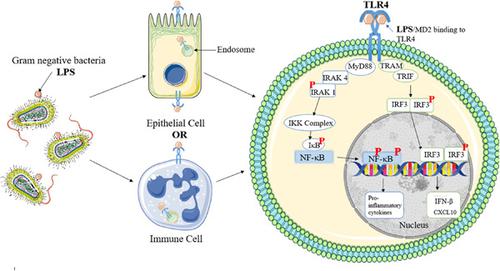当前位置:
X-MOL 学术
›
J. Cell. Physiol.
›
论文详情
Our official English website, www.x-mol.net, welcomes your
feedback! (Note: you will need to create a separate account there.)
Site-specific contribution of Toll-like receptor 4 to intestinal homeostasis and inflammatory disease.
Journal of Cellular Physiology ( IF 4.5 ) Pub Date : 2020-07-30 , DOI: 10.1002/jcp.29976 Elise E Bruning 1 , Janet K Coller 2 , Hannah R Wardill 1, 3 , Joanne M Bowen 1
Journal of Cellular Physiology ( IF 4.5 ) Pub Date : 2020-07-30 , DOI: 10.1002/jcp.29976 Elise E Bruning 1 , Janet K Coller 2 , Hannah R Wardill 1, 3 , Joanne M Bowen 1
Affiliation

|
Toll‐like receptor 4 (TLR4) is a highly conserved protein of innate immunity, responsible for the regulation and maintenance of homeostasis, as well as immune recognition of external and internal ligands. TLR4 is expressed on a variety of cell types throughout the gastrointestinal tract, including on epithelial and immune cell populations. In a healthy state, epithelial cell expression of TLR4 greatly assists in homeostasis by shaping the host microbiome, promoting immunoglobulin A production, and regulating follicle‐associated epithelium permeability. In contrast, immune cell expression of TLR4 in healthy states is primarily centred on the maturation of dendritic cells in response to stimuli, as well as adequately priming the adaptive immune system to fight infection and promote immune memory. Hence, in a healthy state, there is a clear distinction in the site‐specific roles of TLR4 expression. Similarly, recent research has indicated the importance of site‐specific TLR4 expression in inflammation and disease, particularly the impact of epithelial‐specific TLR4 on disease progression. However, the majority of evidence still remains ambiguous for cell‐specific observations, with many studies failing to provide the distinction of epithelial versus immune cell expression of TLR4, preventing specific mechanistic insight and greatly impacting the translation of results. The following review provides a critical overview of the current understanding of site‐specific TLR4 activity and its contribution to intestinal/immune homeostasis and inflammatory diseases.
中文翻译:

Toll 样受体 4 对肠道稳态和炎症疾病的位点特异性贡献。
Toll 样受体 4 (TLR4) 是一种高度保守的先天免疫蛋白,负责调节和维持体内平衡,以及对外部和内部配体的免疫识别。TLR4 在整个胃肠道的多种细胞类型上表达,包括上皮细胞和免疫细胞群。在健康状态下,TLR4 的上皮细胞表达通过塑造宿主微生物组、促进免疫球蛋白 A 的产生和调节卵泡相关上皮细胞通透性,极大地有助于体内平衡。相比之下,TLR4 在健康状态下的免疫细胞表达主要集中在树突状细胞对刺激做出反应的成熟上,以及充分启动适应性免疫系统以对抗感染和促进免疫记忆。因此,在健康状态下,TLR4 表达的位点特异性作用有明显区别。同样,最近的研究表明,位点特异性 TLR4 表达在炎症和疾病中的重要性,尤其是上皮特异性 TLR4 对疾病进展的影响。然而,大多数证据对于细胞特异性观察仍然不明确,许多研究未能区分 TLR4 的上皮细胞与免疫细胞表达,阻碍了特定的机制洞察力并极大地影响了结果的转化。以下综述提供了当前对位点特异性 TLR4 活性及其对肠道/免疫稳态和炎症疾病的贡献的理解的重要概述。最近的研究表明,位点特异性 TLR4 表达在炎症和疾病中的重要性,尤其是上皮特异性 TLR4 对疾病进展的影响。然而,大多数证据对于细胞特异性观察仍然不明确,许多研究未能区分 TLR4 的上皮细胞与免疫细胞表达,阻碍了特定的机制洞察力并极大地影响了结果的转化。以下综述提供了当前对位点特异性 TLR4 活性及其对肠道/免疫稳态和炎症疾病的贡献的理解的重要概述。最近的研究表明,位点特异性 TLR4 表达在炎症和疾病中的重要性,尤其是上皮特异性 TLR4 对疾病进展的影响。然而,大多数证据对于细胞特异性观察仍然不明确,许多研究未能区分 TLR4 的上皮细胞与免疫细胞表达,阻碍了特定的机制洞察力并极大地影响了结果的转化。以下综述提供了当前对位点特异性 TLR4 活性及其对肠道/免疫稳态和炎症疾病的贡献的理解的重要概述。对于细胞特异性观察,大多数证据仍然不明确,许多研究未能区分 TLR4 的上皮细胞与免疫细胞表达,阻碍了特定的机制洞察力并极大地影响了结果的转化。以下综述提供了当前对位点特异性 TLR4 活性及其对肠道/免疫稳态和炎症疾病的贡献的理解的重要概述。对于细胞特异性观察,大多数证据仍然不明确,许多研究未能区分 TLR4 的上皮细胞与免疫细胞表达,阻碍了特定的机制洞察力并极大地影响了结果的转化。以下综述提供了当前对位点特异性 TLR4 活性及其对肠道/免疫稳态和炎症疾病的贡献的理解的重要概述。
更新日期:2020-07-30
中文翻译:

Toll 样受体 4 对肠道稳态和炎症疾病的位点特异性贡献。
Toll 样受体 4 (TLR4) 是一种高度保守的先天免疫蛋白,负责调节和维持体内平衡,以及对外部和内部配体的免疫识别。TLR4 在整个胃肠道的多种细胞类型上表达,包括上皮细胞和免疫细胞群。在健康状态下,TLR4 的上皮细胞表达通过塑造宿主微生物组、促进免疫球蛋白 A 的产生和调节卵泡相关上皮细胞通透性,极大地有助于体内平衡。相比之下,TLR4 在健康状态下的免疫细胞表达主要集中在树突状细胞对刺激做出反应的成熟上,以及充分启动适应性免疫系统以对抗感染和促进免疫记忆。因此,在健康状态下,TLR4 表达的位点特异性作用有明显区别。同样,最近的研究表明,位点特异性 TLR4 表达在炎症和疾病中的重要性,尤其是上皮特异性 TLR4 对疾病进展的影响。然而,大多数证据对于细胞特异性观察仍然不明确,许多研究未能区分 TLR4 的上皮细胞与免疫细胞表达,阻碍了特定的机制洞察力并极大地影响了结果的转化。以下综述提供了当前对位点特异性 TLR4 活性及其对肠道/免疫稳态和炎症疾病的贡献的理解的重要概述。最近的研究表明,位点特异性 TLR4 表达在炎症和疾病中的重要性,尤其是上皮特异性 TLR4 对疾病进展的影响。然而,大多数证据对于细胞特异性观察仍然不明确,许多研究未能区分 TLR4 的上皮细胞与免疫细胞表达,阻碍了特定的机制洞察力并极大地影响了结果的转化。以下综述提供了当前对位点特异性 TLR4 活性及其对肠道/免疫稳态和炎症疾病的贡献的理解的重要概述。最近的研究表明,位点特异性 TLR4 表达在炎症和疾病中的重要性,尤其是上皮特异性 TLR4 对疾病进展的影响。然而,大多数证据对于细胞特异性观察仍然不明确,许多研究未能区分 TLR4 的上皮细胞与免疫细胞表达,阻碍了特定的机制洞察力并极大地影响了结果的转化。以下综述提供了当前对位点特异性 TLR4 活性及其对肠道/免疫稳态和炎症疾病的贡献的理解的重要概述。对于细胞特异性观察,大多数证据仍然不明确,许多研究未能区分 TLR4 的上皮细胞与免疫细胞表达,阻碍了特定的机制洞察力并极大地影响了结果的转化。以下综述提供了当前对位点特异性 TLR4 活性及其对肠道/免疫稳态和炎症疾病的贡献的理解的重要概述。对于细胞特异性观察,大多数证据仍然不明确,许多研究未能区分 TLR4 的上皮细胞与免疫细胞表达,阻碍了特定的机制洞察力并极大地影响了结果的转化。以下综述提供了当前对位点特异性 TLR4 活性及其对肠道/免疫稳态和炎症疾病的贡献的理解的重要概述。











































 京公网安备 11010802027423号
京公网安备 11010802027423号